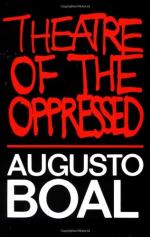|
This section contains 434 words (approx. 2 pages at 400 words per page) |

|
Chapter 2, Machiavelli and the Poetic of Virtù, Machiavelli and Mandragola and Modern Reductions of Virtù Summary and Analysis
In "Machiavelli and Mandragola", Boal discusses Machiavelli's play Mandragola, a transitional play between feudal and bourgeois theater. The characters are in part, individuals, and in part, abstractions. Machiavelli believes that reason, separated from morality, is the key to gaining power or conquering a woman, as in the play. The "virtuous" characters believe in this idea, such as Ligurio, the practical central character who approaches all problems through his own intellect, without thought to morality.
Ligurio alters his attitude and behavior to make the most of any situation, and he goes about, calculatingly, with the help of like-minded amoral and grasping Friar Timoteo, finding a way to seduce honorable Madonna Lucrezia. Timoteo's God is...
|
This section contains 434 words (approx. 2 pages at 400 words per page) |

|




